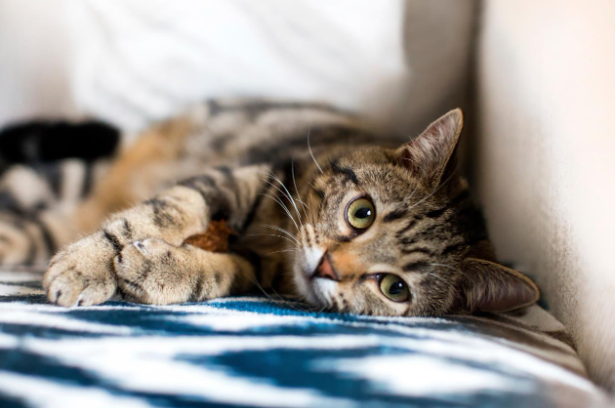The RSPCA has issued an urgent reminder to cat owners in England to get their pets microchipped before the mandatory microchipping law comes into effect.
In just six months time (from Sunday 10 December), any owners who fail to have their cat microchipped could be handed a hefty fine – including indoor cats.
Microchipping your cat means if they are lost or stolen they are much more likely to be returned to their owners.
Rabia Ali’s cat was recently reunited with her after being missing for a year in north London – after the RSPCA scanned for a microchip.
She said: “I thought the worst had happened so I really couldn’t believe it. I think it’s so surreal he is here. I’m in disbelief. The whole family is overjoyed, we thought he was gone.”
The charity’s call comes as RSPCA data shows that 75% of adults agree that mandatory microchipping will help to reduce the number of stray and abandoned cats, rising to 83% in agreement amongst cat owners.
Animal abandonment incidents have soared to a shocking three year high. There were over 8,500 reports of abandoned cats last year which is a stark 25% increase from 2021. However, this year, the charity has already seen another sharp increase with 9,855 reports of cat abandonments so far (up to the end of November).
Alice Potter, cat welfare expert at the RSPCA said: “Cat owners must make sure their cats are microchipped as the new law comes into effect in just six months time. We understand how busy our lives can be and how busy vets can be, so we urge owners with cats over 20 weeks of age to book their appointments now.
“Not only will microchipping your cat mean that if they become lost, stolen, or injured, they are much more likely to be reunited with you, but we also hope that mandatory microchipping will help to tackle important cat welfare issues such as abandonments.”
Under the new legislation, which was announced in March this year, from 10 June 2024 it will be a legal requirement to microchip pet cats in England after they reach 20 weeks of age. Owners will also be required to keep their contact details up-to-date on a pet microchipping database.
Owners found not to have microchipped their cat will have 21 days to get one implanted or may face a fine of up to £500.
A cat who disappeared from his family home in October last year has been reunited with his family thanks to a microchip that helped the RSPCA find his owners
The RSPCA was called to a property in Ilford when a cat believed to be stray had appeared to stop eating and drinking. Animal rescue officer (ARO) Nicola Thomas collected the cat and had him scanned, and was found to have registered keepers that lived just a mile away on Wensleydale Avenue.
Six year-old Simba was returned to Rabia Ali (pictured below with Simba) and her family on Thursday 23 November. She said: “When he went missing we searched day and night for him, there were a lot of tears. We’ve had him since he was a kitten and he is very much a member of the family.
“Despite extensive searches we heard nothing – until 23 November when an RSPCA animal rescuer came to my door and asked if I had a cat called Simba – and said he would be back home in five minutes! Before this, I thought the worst had happened, so I really couldn’t believe it!
“When she brought him home I knew it was him immediately from a distinctive mark on his leg. He is happy to be home. I can tell he is happy to be in the warmth with food and with people he recognises. He is so relieved.
“As a family we feel so blessed and thankful for the work the RSPCA does. Until it happens to you, you don’t realise how vital the charity is. We are so thankful.”
ARO Nicola said: “It was so lovely to bring Simba back home after all that time away. He’s been fed by someone living nearby since April and was assumed to be a stray. Thankfully he is healthy and seems very happy to be home in comfort!
“The obvious distress was visible in his owner’s face when I first spoke to her as she thought I was going to tell her he had died. She squealed with joy when I told her he was alive and well and I would be bringing him home shortly.
“This would never have been possible without his microchip. Such a simple thing that people often fail to keep updated but is essential in helping reunite pets with owners if they become injured or go missing. This new law means that lost cats can be easily identified and reunited with their owners, rather than being handed to rehoming charities who are struggling with overflowing waiting lists. With six months to go, our message to all cat owners is – get them chipped!”
Microchipping is a very easy and painless procedure which involves a tiny microchip being quickly and simply inserted under the animal’s skin and this then gives the pet their own unique code. The microchip can be scanned and matched to the owner’s contact details which are kept on a database. The RSPCA believes the optimum time to microchip a cat is when they are neutered as a kitten at around four-months-old and under anaesthetic.
If an owner moves house or changes their telephone number they must also make sure that they tell the database they are registered with so that they have up-to-date contact details. If the information on that database is old and out-of-date then the chip is useless. Telling your vet does not automatically update the details on the database, but this is something owners can easily do themselves online.
Whilst the RSPCA is thrilled to see cat microchipping laws being introduced in England, the charity is also calling on the Welsh Government to act and introduce compulsory microchipping for cats in Wales too.




